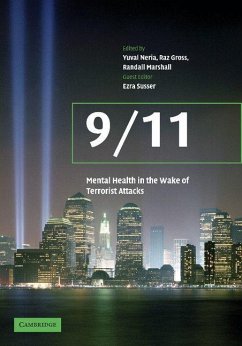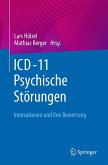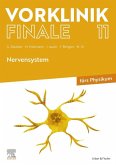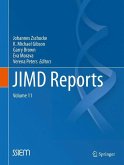9/11
Mental Health in the Wake of Terrorist Attacks
Herausgeber: Neria, Yuval; Marshall, Randall D.; Gross, Raz
9/11
Mental Health in the Wake of Terrorist Attacks
Herausgeber: Neria, Yuval; Marshall, Randall D.; Gross, Raz
- Broschiertes Buch
- Merkliste
- Auf die Merkliste
- Bewerten Bewerten
- Teilen
- Produkt teilen
- Produkterinnerung
- Produkterinnerung
A handbook for all who would research the impact of disaster and terrorism on mental health and well-being.
Andere Kunden interessierten sich auch für
![9/11 9/11]() Yuval Neria / Raz Gross / Randall D. Marshall / Ezra S. Susser (eds.)9/11199,99 €
Yuval Neria / Raz Gross / Randall D. Marshall / Ezra S. Susser (eds.)9/11199,99 €![ICD-11 - Psychische Störungen ICD-11 - Psychische Störungen]() ICD-11 - Psychische Störungen59,99 €
ICD-11 - Psychische Störungen59,99 €![Vorklinik Finale 11 Vorklinik Finale 11]() Gregor DäublerVorklinik Finale 1110,00 €
Gregor DäublerVorklinik Finale 1110,00 €![Advances in Human Genetics 11 Advances in Human Genetics 11]() Harry HarrisAdvances in Human Genetics 1141,99 €
Harry HarrisAdvances in Human Genetics 1141,99 €![Ultrasonography in Ophthalmology 11 Ultrasonography in Ophthalmology 11]() Ultrasonography in Ophthalmology 1141,99 €
Ultrasonography in Ophthalmology 1141,99 €![JIMD Reports - Volume 11 JIMD Reports - Volume 11]() JIMD Reports - Volume 1175,99 €
JIMD Reports - Volume 1175,99 €![Depression & Suicide, the Long View Your 18th Psychiatric Consultation William Yee M.D., J.D. Copyright Applied for 11/30/2020 Depression & Suicide, the Long View Your 18th Psychiatric Consultation William Yee M.D., J.D. Copyright Applied for 11/30/2020]() William YeeDepression & Suicide, the Long View Your 18th Psychiatric Consultation William Yee M.D., J.D. Copyright Applied for 11/30/202013,99 €
William YeeDepression & Suicide, the Long View Your 18th Psychiatric Consultation William Yee M.D., J.D. Copyright Applied for 11/30/202013,99 €-
-
-
A handbook for all who would research the impact of disaster and terrorism on mental health and well-being.
Hinweis: Dieser Artikel kann nur an eine deutsche Lieferadresse ausgeliefert werden.
Hinweis: Dieser Artikel kann nur an eine deutsche Lieferadresse ausgeliefert werden.
Produktdetails
- Produktdetails
- Verlag: Cambridge University Press
- Seitenzahl: 676
- Erscheinungstermin: 22. Mai 2012
- Englisch
- Abmessung: 244mm x 170mm x 36mm
- Gewicht: 1147g
- ISBN-13: 9781107406421
- ISBN-10: 1107406420
- Artikelnr.: 35894812
- Herstellerkennzeichnung
- Libri GmbH
- Europaallee 1
- 36244 Bad Hersfeld
- gpsr@libri.de
- Verlag: Cambridge University Press
- Seitenzahl: 676
- Erscheinungstermin: 22. Mai 2012
- Englisch
- Abmessung: 244mm x 170mm x 36mm
- Gewicht: 1147g
- ISBN-13: 9781107406421
- ISBN-10: 1107406420
- Artikelnr.: 35894812
- Herstellerkennzeichnung
- Libri GmbH
- Europaallee 1
- 36244 Bad Hersfeld
- gpsr@libri.de
Foreword; Part I. Introduction: 1. Mental health in the aftermath of
terrorist attacks: making sense of mass casualty trauma; Part II. The
Psychological Aftermath of 9/11: 2. Preface; 3. Posttraumatic stress
symptoms in the general population after disaster: implications for public
health; 4. Coping with a national trauma: A nationwide longitudinal study
of responses to the terrorist attacks of September 11th; 5. An
epidemiological response to disasters: the New York City Board of
Education's Post 9/11 Needs Assessment; 6. Historical perspective and
future directions in research on psychiatric consequences of terrorism and
other disasters; 7. Capturing the impact of large-scale events through
epidemiological research: challenges and obstacles; 8. Mental health
research in the aftermath of disasters: using the right methods to ask the
right questions; Part III. Reducing the Burden: Community Response and
Community Recovery: 9. Community and ecological approaches to understanding
and alleviating postdisaster distress (Introduction to section); 10. What
is collective recovery?; 11. Rebuilding communities post disaster in New
York; 12. Journalism and the public during catastrophes; 13. Effective
leadership in extreme crisis; 14. Guiding community intervention following
terrorist attack; Part IV. Outreach and Intervention in the Wake of
Terrorist Attacks: 15. Science for the community after 9/11; Part IV.i. New
York Area: 16. The psychological aftermath of 9/11 attacks in primary care;
17. Project Liberty: responding to mental health needs after the World
Trade Center terrorist attacks; 18. The Mental Health Association of New
York City; 19. The New York Consortium for Effective Trauma Treatment; 20.
First responders: FDNY and Con Edison; 21. The World Trade Center
Worker/Volunteer Mental Health Screening Program; 22. Child and adolescent
trauma treatments and services after September 11: implementing
evidence-based practices into complex child-serving systems; 23.
Relationally and developmentally focused interventions with young children
and their caregivers in the wake of terrorism and other violent
experiences; Part IV.ii. Washington DC: 24. The mental health response to
the 9/11 attacks on the Pentagon; 25. Learning lessons from the early
intervention response at the Pentagon (commentary); Part IV.iii.
Prolonged-Exposure Treatment as a Core Resource for Clinicians in the
Community: Dissemination of Trauma Knowledge Post Disaster: 26.
Psychological treatments for PTSD: an Overview; 27. Dissemination of
prolonged exposure therapy for PTSD: successes and challenges; 28. Training
therapists to practice evidence-based psychotherapy after 9/11; Part V.
Disasters and Mental Health: Perspectives on Response and Preparedness: 29.
The Epidemiology of 9-11: technological advances and conceptual conundrums;
30. Searching for points of convergence: a commentary on prior research on
disasters and some community programs initiated in response to September
11, 2001; 31. What mental health professionals should and shouldn't do; 32.
Coping with the threat of terrorism; 33. Preparedness and future
directions; 34. Lessons learned from 9/11: the boundaries of a mental
health approach to mass casualty events; 35. Post-disaster research:
lessons learned from 9/11 and future directions.
terrorist attacks: making sense of mass casualty trauma; Part II. The
Psychological Aftermath of 9/11: 2. Preface; 3. Posttraumatic stress
symptoms in the general population after disaster: implications for public
health; 4. Coping with a national trauma: A nationwide longitudinal study
of responses to the terrorist attacks of September 11th; 5. An
epidemiological response to disasters: the New York City Board of
Education's Post 9/11 Needs Assessment; 6. Historical perspective and
future directions in research on psychiatric consequences of terrorism and
other disasters; 7. Capturing the impact of large-scale events through
epidemiological research: challenges and obstacles; 8. Mental health
research in the aftermath of disasters: using the right methods to ask the
right questions; Part III. Reducing the Burden: Community Response and
Community Recovery: 9. Community and ecological approaches to understanding
and alleviating postdisaster distress (Introduction to section); 10. What
is collective recovery?; 11. Rebuilding communities post disaster in New
York; 12. Journalism and the public during catastrophes; 13. Effective
leadership in extreme crisis; 14. Guiding community intervention following
terrorist attack; Part IV. Outreach and Intervention in the Wake of
Terrorist Attacks: 15. Science for the community after 9/11; Part IV.i. New
York Area: 16. The psychological aftermath of 9/11 attacks in primary care;
17. Project Liberty: responding to mental health needs after the World
Trade Center terrorist attacks; 18. The Mental Health Association of New
York City; 19. The New York Consortium for Effective Trauma Treatment; 20.
First responders: FDNY and Con Edison; 21. The World Trade Center
Worker/Volunteer Mental Health Screening Program; 22. Child and adolescent
trauma treatments and services after September 11: implementing
evidence-based practices into complex child-serving systems; 23.
Relationally and developmentally focused interventions with young children
and their caregivers in the wake of terrorism and other violent
experiences; Part IV.ii. Washington DC: 24. The mental health response to
the 9/11 attacks on the Pentagon; 25. Learning lessons from the early
intervention response at the Pentagon (commentary); Part IV.iii.
Prolonged-Exposure Treatment as a Core Resource for Clinicians in the
Community: Dissemination of Trauma Knowledge Post Disaster: 26.
Psychological treatments for PTSD: an Overview; 27. Dissemination of
prolonged exposure therapy for PTSD: successes and challenges; 28. Training
therapists to practice evidence-based psychotherapy after 9/11; Part V.
Disasters and Mental Health: Perspectives on Response and Preparedness: 29.
The Epidemiology of 9-11: technological advances and conceptual conundrums;
30. Searching for points of convergence: a commentary on prior research on
disasters and some community programs initiated in response to September
11, 2001; 31. What mental health professionals should and shouldn't do; 32.
Coping with the threat of terrorism; 33. Preparedness and future
directions; 34. Lessons learned from 9/11: the boundaries of a mental
health approach to mass casualty events; 35. Post-disaster research:
lessons learned from 9/11 and future directions.
Foreword; Part I. Introduction: 1. Mental health in the aftermath of
terrorist attacks: making sense of mass casualty trauma; Part II. The
Psychological Aftermath of 9/11: 2. Preface; 3. Posttraumatic stress
symptoms in the general population after disaster: implications for public
health; 4. Coping with a national trauma: A nationwide longitudinal study
of responses to the terrorist attacks of September 11th; 5. An
epidemiological response to disasters: the New York City Board of
Education's Post 9/11 Needs Assessment; 6. Historical perspective and
future directions in research on psychiatric consequences of terrorism and
other disasters; 7. Capturing the impact of large-scale events through
epidemiological research: challenges and obstacles; 8. Mental health
research in the aftermath of disasters: using the right methods to ask the
right questions; Part III. Reducing the Burden: Community Response and
Community Recovery: 9. Community and ecological approaches to understanding
and alleviating postdisaster distress (Introduction to section); 10. What
is collective recovery?; 11. Rebuilding communities post disaster in New
York; 12. Journalism and the public during catastrophes; 13. Effective
leadership in extreme crisis; 14. Guiding community intervention following
terrorist attack; Part IV. Outreach and Intervention in the Wake of
Terrorist Attacks: 15. Science for the community after 9/11; Part IV.i. New
York Area: 16. The psychological aftermath of 9/11 attacks in primary care;
17. Project Liberty: responding to mental health needs after the World
Trade Center terrorist attacks; 18. The Mental Health Association of New
York City; 19. The New York Consortium for Effective Trauma Treatment; 20.
First responders: FDNY and Con Edison; 21. The World Trade Center
Worker/Volunteer Mental Health Screening Program; 22. Child and adolescent
trauma treatments and services after September 11: implementing
evidence-based practices into complex child-serving systems; 23.
Relationally and developmentally focused interventions with young children
and their caregivers in the wake of terrorism and other violent
experiences; Part IV.ii. Washington DC: 24. The mental health response to
the 9/11 attacks on the Pentagon; 25. Learning lessons from the early
intervention response at the Pentagon (commentary); Part IV.iii.
Prolonged-Exposure Treatment as a Core Resource for Clinicians in the
Community: Dissemination of Trauma Knowledge Post Disaster: 26.
Psychological treatments for PTSD: an Overview; 27. Dissemination of
prolonged exposure therapy for PTSD: successes and challenges; 28. Training
therapists to practice evidence-based psychotherapy after 9/11; Part V.
Disasters and Mental Health: Perspectives on Response and Preparedness: 29.
The Epidemiology of 9-11: technological advances and conceptual conundrums;
30. Searching for points of convergence: a commentary on prior research on
disasters and some community programs initiated in response to September
11, 2001; 31. What mental health professionals should and shouldn't do; 32.
Coping with the threat of terrorism; 33. Preparedness and future
directions; 34. Lessons learned from 9/11: the boundaries of a mental
health approach to mass casualty events; 35. Post-disaster research:
lessons learned from 9/11 and future directions.
terrorist attacks: making sense of mass casualty trauma; Part II. The
Psychological Aftermath of 9/11: 2. Preface; 3. Posttraumatic stress
symptoms in the general population after disaster: implications for public
health; 4. Coping with a national trauma: A nationwide longitudinal study
of responses to the terrorist attacks of September 11th; 5. An
epidemiological response to disasters: the New York City Board of
Education's Post 9/11 Needs Assessment; 6. Historical perspective and
future directions in research on psychiatric consequences of terrorism and
other disasters; 7. Capturing the impact of large-scale events through
epidemiological research: challenges and obstacles; 8. Mental health
research in the aftermath of disasters: using the right methods to ask the
right questions; Part III. Reducing the Burden: Community Response and
Community Recovery: 9. Community and ecological approaches to understanding
and alleviating postdisaster distress (Introduction to section); 10. What
is collective recovery?; 11. Rebuilding communities post disaster in New
York; 12. Journalism and the public during catastrophes; 13. Effective
leadership in extreme crisis; 14. Guiding community intervention following
terrorist attack; Part IV. Outreach and Intervention in the Wake of
Terrorist Attacks: 15. Science for the community after 9/11; Part IV.i. New
York Area: 16. The psychological aftermath of 9/11 attacks in primary care;
17. Project Liberty: responding to mental health needs after the World
Trade Center terrorist attacks; 18. The Mental Health Association of New
York City; 19. The New York Consortium for Effective Trauma Treatment; 20.
First responders: FDNY and Con Edison; 21. The World Trade Center
Worker/Volunteer Mental Health Screening Program; 22. Child and adolescent
trauma treatments and services after September 11: implementing
evidence-based practices into complex child-serving systems; 23.
Relationally and developmentally focused interventions with young children
and their caregivers in the wake of terrorism and other violent
experiences; Part IV.ii. Washington DC: 24. The mental health response to
the 9/11 attacks on the Pentagon; 25. Learning lessons from the early
intervention response at the Pentagon (commentary); Part IV.iii.
Prolonged-Exposure Treatment as a Core Resource for Clinicians in the
Community: Dissemination of Trauma Knowledge Post Disaster: 26.
Psychological treatments for PTSD: an Overview; 27. Dissemination of
prolonged exposure therapy for PTSD: successes and challenges; 28. Training
therapists to practice evidence-based psychotherapy after 9/11; Part V.
Disasters and Mental Health: Perspectives on Response and Preparedness: 29.
The Epidemiology of 9-11: technological advances and conceptual conundrums;
30. Searching for points of convergence: a commentary on prior research on
disasters and some community programs initiated in response to September
11, 2001; 31. What mental health professionals should and shouldn't do; 32.
Coping with the threat of terrorism; 33. Preparedness and future
directions; 34. Lessons learned from 9/11: the boundaries of a mental
health approach to mass casualty events; 35. Post-disaster research:
lessons learned from 9/11 and future directions.








